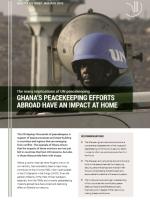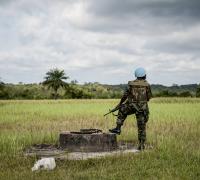Ghana's peacekeeping efforts abroad have an impact at home
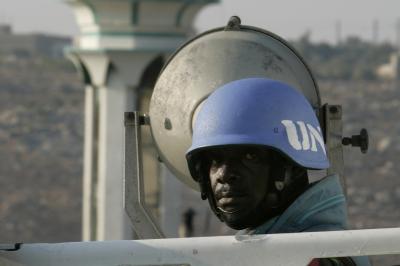
The UN deploys thousands of peacekeepers in support of peace processes and state-building in countries and regions that are emerging from conflict. The example of Ghana shows that the impacts of these missions are not just felt in countries that host UN missions, but also in those that provide them with troops.
■ The Ghanaian army and police should continue to build on the lessons learned from deploying security personnel abroad and maintain their focus on consolidating the democratic and accountable foundations of the security sector.
■ The UN should build a stronger understanding of how countries that contribute to peace- keeping missions are affected politically, financially and in respect of their security by making these contributions.
Ghana, a country that has never fought a war on its own territory, has consistently been a major troop contributor to the UN since 1960, when it participated in the UN Operation in the Congo (UNOC). Given the general instability of the West African subregion, especially from the 1990s and onwards, peacekeeping missions abroad have had a direct and stabilizing effect on Ghana’s own security.
For instance, contributions to peacekeeping have served Ghana’s national security interests by preventing the spillover effects of conflicts in neighboring or nearby countries such as Sierra Leone, Liberia, Côte d’Ivoire and Mali.
At the same time, contributions to peacekeeping missions have had comprehensive impacts on Ghana’s security sector. The army and police in particular have been shaped and depoliticized domestically by the opportunity to deploy in UN missions abroad
Moreover, these contributions have shaped the country’s governance system and practices of internal security provision involving both the police and military, as well as providing important economic incentives both institutionally and individually.
Restricting military interference in politics
Prior to declaring the Fourth Republic in 1992, the Ghanaian military interfered in domestic politics as a response to the country’s economic challenges and exploited the grievances of military personnel with respect to their conditions of service. While successive governments since then have implemented policies like the Single Spine Salary Structure to improve conditions of service, the impact of such initiatives has been negligible at best. Furthermore, the public sentiment that facilitated military coups in the 1960s and 1970s persists in the country today, though to a lesser extent.
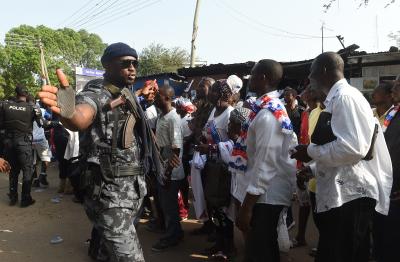
Counter-balancing these ongoing challenges, it is believed at the heart of Ghana’s political system, as well as within its security institutions, that the participation of troops in UN missions has playedan important role in consolidating democratic processes domestically. The peacekeeping experience has transformed behavior and attitudes, countering the ‘coup-making mentality’ in the armed forces in particular.
One of the reasons for this transformation is to be found in the bureaucratic exercise involved in developing UN peacekeeping policies, standards and training programs, often with support from bilateral and multilateral partners. Preparing and deploying peacekeepers have given direction to army and police practices in Ghana and helped shape them. The consistency of this work, spanning more than half a century, has contributed to instilling a degree of discipline in both forces.
Peacekeeping missions abroad have had a direct and stabilizing effect on Ghana’s own security
More pragmatically, peacekeeping has directed the army’s attention, available resources and efforts to overseas missions rather than domestic politics. By serving in UN missions, the military has also been exposed to an organization led by a civilian political authority, the Special Representative of the Secretary-General. This has made the role of civilians in military affairs more familiar and acceptable.
Finally, participation in peacekeeping has no doubt had an enduring psychological impact in the form of a restraining effect on military personnel who have witnessed the costs of war in post-conflict countries such as Liberia, Sierra Leone, Rwanda and Bosnia-Herzegovina.
Building stronger institutions through deployment
Beyond restraining the interference of the army and police in national politics, the institutional impact of peacekeeping on both forces has been comprehensive with respect to new initiatives. Among other developments, the military’s reputation for committing human rights abuses, which was notorious in the 1970s and 1980s, has waned since the late twentieth century. The consistent long-term exposure to human rights standards that peacekeeping personnel go through during their pre-deployment and in-mission training programs, as well as their everyday mission work, has played an important transformational role in this regard. Furthermore, because the Ghanaian army is not yet battle-tested, either within its own territory or in the context of UN peacekeeping missions, peacekeeping training and experience have helped troops prepare for the eventuality of a nationwide conflict. This has also allowed the army to test its military equipment, some of which has been bought with money earned from peacekeeping deployments, including cargo aircraft in Mali, where the UN mission incorporates elements of peacemaking.
The army and police in particular have been shaped and depoliticized domestically by the opportunity to deploy in UN missions abroad.
The influence of peacekeeping on the Ghana police can be seen in their current agenda of transformation, especially in the areas of community policing, the use of information and communication technology and the establishment of new bodies such as the Formed Police Unit to deal with specialized law enforcement matters (operations). Establishment of the Formed Police Unit as well as the Community Policing Unit in2011 were partly inspired by the UN’s community policing concept and the in-mission role of Formed Police Units. Equally, the use of information and communication technology, for example, for tracking during operations, is another area where the peacekeeping experience has played a part.
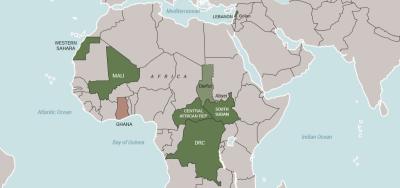
Among the challenges arising from peacekeeping contributions is the turnover of military and police staff. Often, the personnel who end up leaving to join the UN (and other international organizations) are precisely those with the more specialized skills and greater experience. They are either frustrated due to the lack of promotion at home or dissatisfied with their conditions of service.
Using international experiences domestically
The experience of peacekeeping has fundamentally influenced how what are referred to as internal security operations in Ghana are organized by the police and military. Examples include ‘Operation Cow Leg’, deployed to deal with conflicts between farmers and herders, ‘Operation Vanguard’ to deal with illegal mining and ‘Operation Calm Life’, formed to combat crime. Despite the operational challenges that have confronted these joint military-police exercises, they show how the peacekeeping experience shapes domestic operations.
‘Operation Vanguard’, for instance, which is ongoing, has a unique structure that resembles the multidimensional organization of a UN peacekeeping mission. It has a political wing led by an inter-ministerial committee that provides the operation with strategic leadership; an operational wing commanded by the military, with a police deputy; and three forward operating bases at the tactical level in the Ashanti, Eastern and Western Regions, where illegal mining has been particularly pervasive. None of these operations can be said to have been unqualified successes, butnonetheless they show the extent to which the peacekeeping experience has shaped Ghana’s security responses at home. This makes it all the more important to understand how countries that contribute to peacekeeping are shaped by the experience, specifically with respect to how they organize their security sectors, and how the police and military end up carrying out their respective mandates as a consequence.
The economic impact of peacekeeping
Official figures on the amount of money that Ghana is generating from peacekeeping are not available. However, anecdotal evidence suggests that the country is earning a significant amount of foreign currency through the reimbursement package that the UN offers the government and the mission subsistence allowance given to personnel. Generally the UN reimburses the government as part of the Contingent Owned Equipment system. In 2015, for instance, the Ghana Aviation Unit was paid over USD 500,000 a month for its deployment with the UN Multidimensional Integrated Stabilization Mission in Mali. On the individual level, Ghanaian military personnel serving abroad as ‘blue helmets’ receive USD 35 a day, staff officers an average of USD 135 a day and police personnel about USD 150 a day.
Given that most personnel are deployed for at least a year, the cumulative amount of money with which they return is considerable, making a major contribution to the country’s foreign exchange earnings. For the government and the army especially, these financial gains represent an important supplement to the national defense budget, some of which has been used to purchase aircraft and other military equipment. Deployment also influences individual personnel, allowing them to invest foreign currency in education, housing and the private sector. The end result is a boost to the local economy.
This policy brief is produced with support from the Danish Ministry of Foreign Affairs.
DIIS Experts

